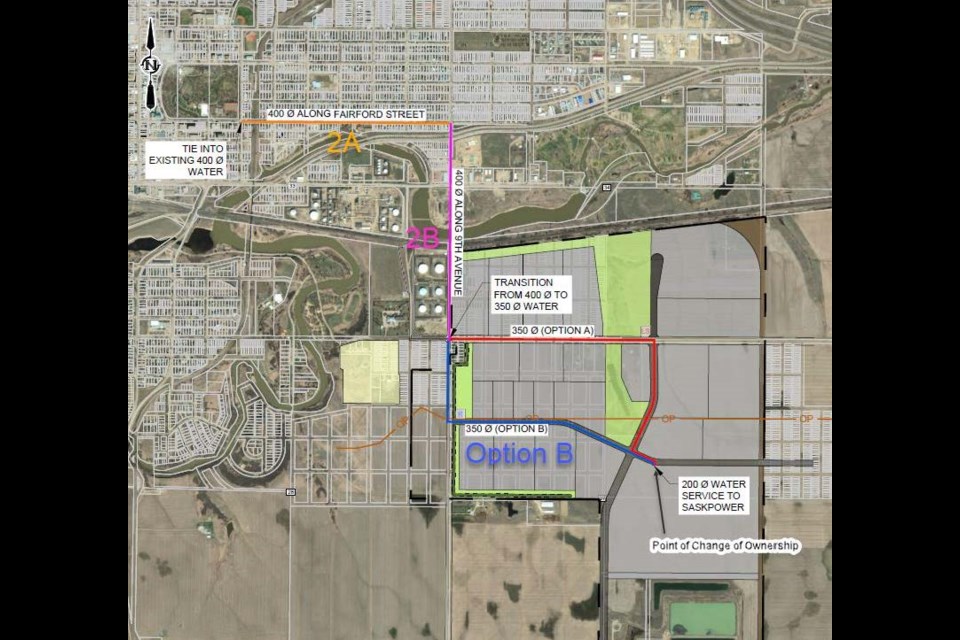While the deal with SaskPower to secure its natural gas plant will have “a colossal and positive impact” on Moose Jaw, city hall had to make several concessions to seal the deal.
The Crown corporation intends to build its $700-million combined cycle natural gas plant on 43.5 hectares (108.77 acres) in the Southeast Industrial Park (SEIP) for $5,600 per acre, or $609,112. About 800 jobs will be created to construct the plant during the next three years, while 25 permanent, full-time positions will be created once the building is operational.
During its Jan. 13 regular meeting, city council unanimously approved a motion to have the city clerk and mayor finalize the service agreement with SaskPower, while city administration was authorized to refund the Crown company for 1.05 acres of land at $5,600 per acre since its required parcel size was reduced to 108.77 acres from 109.82 acres.
This subject originally came to council on Dec. 19, 2018, when a report was presented about SaskPower’s offer to purchase land for the natural gas plant. However, project details were kept under wraps for the next 13 months as city administration and SaskPower representatives hammered out a deal. Approving the service agreement was the first time council had time to discuss the final document.
“I would like to thank our team members for their outstanding efforts and unflagging patience, perseverance and commitment to this project that will have such a colossal and positive impact upon the future of Moose Jaw,” city manager Jim Puffalt said in the report to council.
Municipal funding
While the municipality will receive $609,112, it will spend $2.5 million to upgrade area infrastructure. City administration expects that money to come from the finalization of the land development and servicing agreements with Carpere Canada in February; should that company back out, the municipality will be on the hook for that funding.
This project will benefit from $900,000 in federal and provincial funding, while SaskPower will contribute about $9.27 million through infrastructure upgrades, not including investment in power and gas infrastructure for about $40 million. This particular infrastructure would benefit all SEIP tenants.
Bylaw implications
The business plan negotiated in the service agreement affects some established municipal policies and bylaws, the report says. City administration proposed to resolve the conflicts through a separate exemption bylaw; this was approved later in the meeting.
The proposed exemption bylaw addresses the following issues:
• Sections 3, 5 and 6 of the agreement allow SaskPower to approve all procurement-related evaluation criteria and award to contractors, consultants and engineers. This conflicts with the municipal purchasing policy that prohibits the public release of supplier or contract information that would disclose proprietary information.
Since proprietary information is also exempt from disclosure under privacy legislation, section 20 of the agreement imposes strict confidentiality requirements on all parties. Moreover, municipal procurement documents will be amended to notify all bidders/proponents that SaskPower is involved in the procurement process.
• Section 13.5 of the service agreement refers utility disputes to an oversight committee that would be established. This provision conflicts with the terms and conditions of service policy that requires disputes to be referred to the administrative review officer.
The proposed exemption bylaw would allow a separate dispute resolution mechanism based on the agreement.
• Due to the “unique nature” of the plant operation, SaskPower will pay a sewage and process fee based on 15 per cent of actual water consumption. This conflicts with the sewer and water utility bylaw. The proposed exemption bylaw would reflect the negotiated rate to the Crown corporation.
• In accordance with the offer to purchase, an exemption to the city development levy bylaw would be required. Normally contractors pay a levy when developing a section of the city to help maintain that area.
Service agreement overview
Aside from road upgrades and the process wastewater line, the municipality will manage all construction contracts and will own and operate the infrastructure long-term, the report said. Payment will be made based on actual tendered costs, including consulting and engineering fees.
Water: The municipality will build, own and operate water infrastructure for about $7.12 million. SaskPower will pay 70 per cent of the cost of upgrades, which will benefit the existing water distribution network and will also be sized to allow for future development in the industrial park.
Sewer: The municipality will build, own and operate the infrastructure for about $300,000. SaskPower will pay 100 per cent of the cost to build the piping.
Water, sewer and phase 1A design: Federal and provincial grants will pay for 75 per cent of this, while SaskPower and the municipality will cost-share the remaining 25 per cent.
Storm sewer: The City of Moose Jaw will build, own and operate the infrastructure for about $350,000. SaskPower will pay 100 per cent of the cost to build.
Roads: SaskPower will pay $1.5 million to upgrade roads in the industrial park.
Process water: SaskPower will build, own, operate and maintain a direct wastewater line to municipal lagoons. The corporation will pay standard water use rates, although a special water rate has been negotiated due to a large volume of process wastewater being lost either to evaporation or sent directly to the lagoons untreated.
Firefighting: SaskPower will pay $115,000 per year for firefighting costs, plus call out fees if an accident happens.
Public annoyance
The report notes several concerns were raised through SaskPower’s public consultation process and the development of the municipal concept plan for the area. These concerns, which included traffic, noise, landscaping and visual buffers, are expected to be addressed between SaskPower and the municipality during construction and the development permit process.
The next regular council meeting is Jan. 27.


.png;w=120;h=80;mode=crop)

